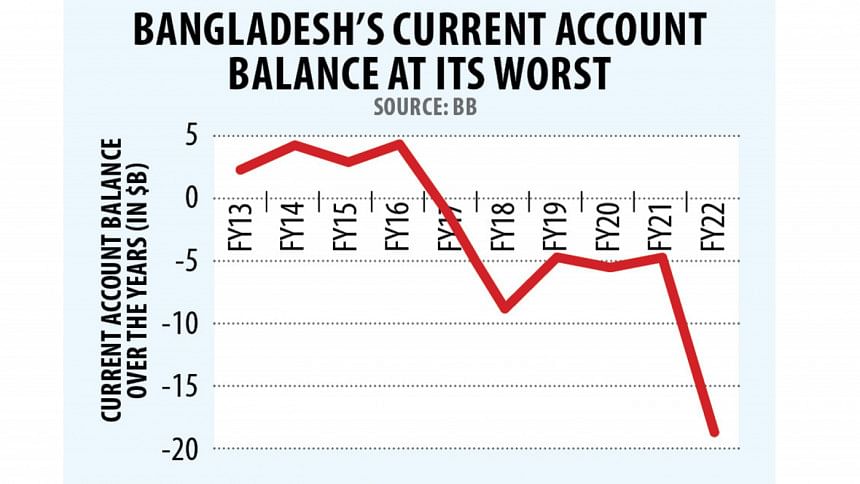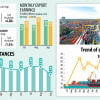Current account balance: Sinks further in red

Bangladesh's current account balance sank further in the red in September, heaving the pressure on the exchange rate that is trading at record lows against the US dollar.
The current account records a nation's transactions with the rest of the world, specifically its net trade in goods and services.
At the end of September, the current account was $3.6 billion in the deficit as both exports and remittances dropped and imports remained elevated, according to data from the Bangladesh Bank.
A year earlier, the current account had posted a deficit of $2.5 billion.
"In August, the policymakers said the situation will get better soon citing the import control measures. But things are getting worse," said Zahid Hussain, a former lead economist of the World Bank's Dhaka office.
The deficit is expected to widen further seeing both export and remittance, the two main components of the current account, dropped for the second consecutive month in October.
In fact, as per BB's latest projection, the shortfall in the current account will swell to $16.5 billion by the end of fiscal 2022-23.
The yawning current account deficit -- which was $1.5 billion in August -- means the exchange rate and foreign exchange reserves will come under further pressure.
As of October 26, gross foreign exchange reserves stood at $35.9 billion -- an import cover of just a little over four months. A year earlier, reserves stood at $46.5 billion, which was enough to cover more than seven months of import bills.
On November 1, a dollar traded for Tk 103.50, down 20 percent from a year earlier.
If the taka depreciates further against the dollar, it will fuel inflation, said Ahsan H Mansur, executive director of the Policy Research Institute of Bangladesh.
In August, inflation hit a 12-year-high of 9.5 percent. It slowed to 9.1 percent in September, according to data from the Bangladesh Bureau of Statistics.
The exchange rate will come under further strain if the central bank tries to safeguard the foreign exchange reserves now, said Monzur Hossain, research director of the Bangladesh Institute of Development Studies.
The central bank has been injecting dollars into the market to keep the exchange rate stable, but this has eroded the reserves to a large extent.
This fiscal year, BB supplied more than $4.5 billion to the market. In fiscal 2021-22, it injected a record $7.6 billion.
Hussain called for immediate withdrawal of the multiple exchange rate system that was introduced by the Bangladesh Foreign Exchange Dealers' Association, a platform of banks to implement foreign exchange-related policies in the market, in September.
The multiple exchange rate system is widening the current account deficit further.
As per BAFEDA's decision, banks are allowed to pay a maximum of Tk 107 for each dollar to remitters.
Over at the kerb market, each dollar traded at Tk 112-Tk 113 last month.
The difference means the migrant workers might have sent their money through hundi, a cross-border illegal financial transaction system that provides an exchange rate closer to the kerb market.
"This explains why the official remittance inflow figures are shrinking."
The remittance inflows are supposed to go up seeing that a record number of migrant workers have gone abroad in recent times, Hussain said.
In the first nine months of this year, 8.75 lakh migrant workers left the country, which is more than the combined numbers of 2020 and 2021.
"Between March and August, migrant workers had sent satisfactory volumes of remittances. It started falling from September," Hussain added.
Mansur fears hundi may continue to thrive and remittance may not pick up even if the exchange rate gap between the formal and informal markets is reduced due to a spike in capital flight prompted by the instability on both the economic and political fronts.
"Under such a situation, the government will face a critical situation to bring stability in the macroeconomic sector."
He, however, hopes the balance of payment situation may improve to some extent if the government manages credit support from multilateral agencies including the International Monetary Fund.
While imports will definitely contract in the coming months as the opening of letters of credit has come down between July and September, the declining trend in export and remittance poses a major worry, said Mansur, a former economist of the IMF.
Export earnings may not rebound in the next couple of months thanks to the economic slowdown in the major markets of North America and Europe, said Mustafizur Rahman, a distinguished fellow at the Centre for Policy Dialogue.
If imports fall, the GDP growth will face a setback, Hossain said.
"The economy is now in a difficult situation," he added.

 For all latest news, follow The Daily Star's Google News channel.
For all latest news, follow The Daily Star's Google News channel. 








Comments